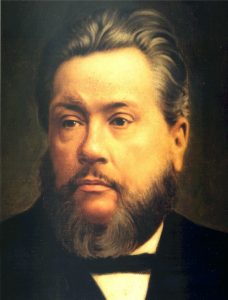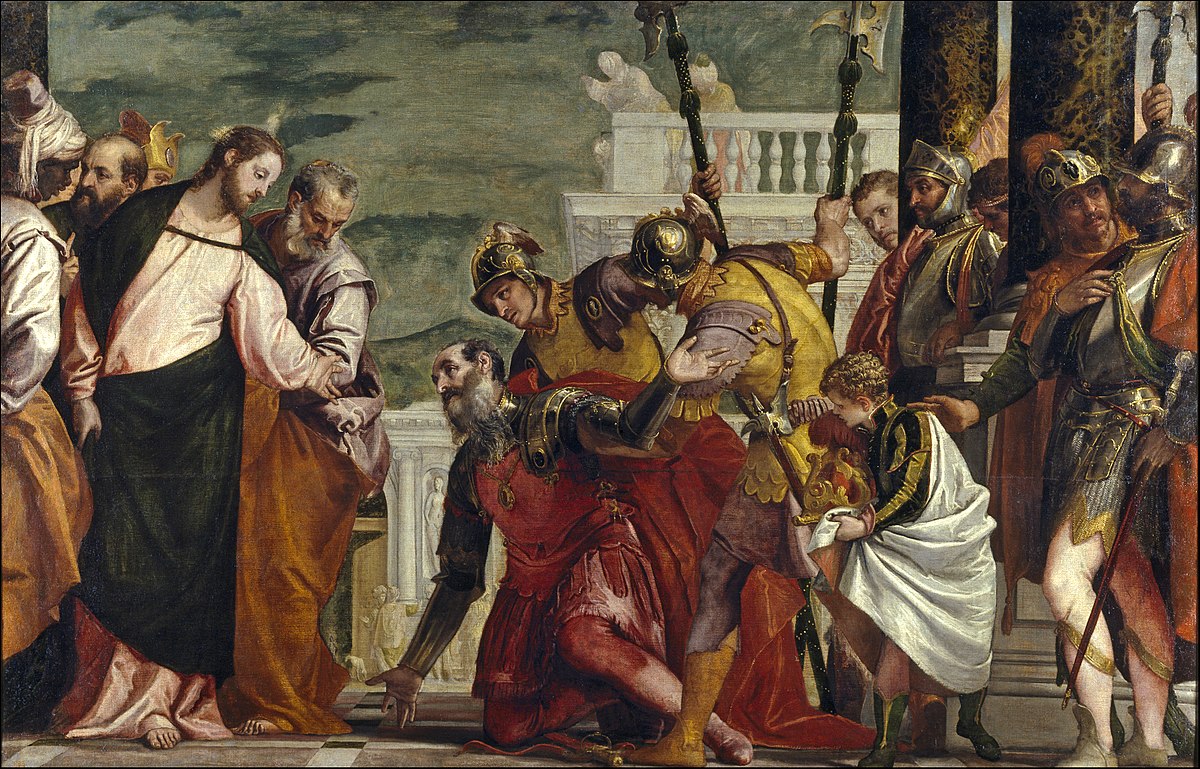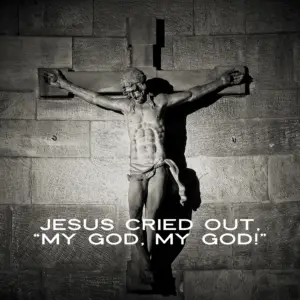In first-century Rome, a centurion was a military officer in charge of a centuria,[1] the smallest unit of soldiers within a legion. Each centurion was ranked and assigned various levels of authority and responsibility, with the first ranking centurion of the first ranking cohort, being called the primus pilus or first spear.[2] The centurion was said to be in the middle of the Roman military hierarchy, having men who ranked in authority both above and below him.[3]
We see this hierarchy referenced in an exchange between Jesus and an unnamed centurion from Capernaum whose servant was sick:
Matthew 8:5-10 (NASB) And when Jesus entered Capernaum, a centurion came to Him, imploring Him, 6 and saying, “Lord, my servant is lying paralyzed at home, fearfully tormented.” 7 Jesus *said to him, “I will come and heal him.” 8 But the centurion said, “Lord, I am not worthy for You to come under my roof, but just say the word, and my servant will be healed. 9 “For I also am a man under authority, with soldiers under me; and I say to this one, ‘Go!’ and he goes, and to another, ‘Come!’ and he comes, and to my slave, ‘Do this!’ and he does it.” 10 Now when Jesus heard this, He marveled and said to those who were following, “Truly I say to you, I have not found such great faith with anyone in Israel.
The text goes on to say that Jesus, amazed at the centurion’s faith, healed his servant at that very moment.[4]
 One aspect that is often overlooked in this familiar narrative is the parallel that the Roman officer draws between himself and Jesus:
One aspect that is often overlooked in this familiar narrative is the parallel that the Roman officer draws between himself and Jesus:
Matthew 8:9 (NASB) “For I also am a man under authority, with soldiers under me; and I say to this one, ‘Go!’ and he goes, and to another, ‘Come!’ and he comes, and to my slave, ‘Do this!’ and he does it.” (emphasis added)
The commander, who was under the authority of the primus pilus, and ultimately the Caesar, recognized that Jesus was also subordinate to a greater authority. According to Jesus, this higher authority is God the Father:
John 14:28 (NASB) “You heard that I said to you, ‘I go away, and I will come to you.’ If you loved Me, you would have rejoiced because I go to the Father, for the Father is greater than I. (emphasis added)
Paul also speaks of God’s supremacy over Christ in his letter to the church in Corinth when he writes that “God is the head of Christ” and “Christ belongs to God.”[5] We’ll look more closely at the apostle’s most declarative statement of Christ’s subordination in a moment. In the meantime, it is important to emphasize that, just as the centurion did not appoint himself to a position of power, neither was Jesus a self-appointed ruler. Indeed, it was God who exalted Jesus to His right hand, having designated the Messiah as the one who would rule on His behalf.[6]
Micah 5:2 (NASB) “But as for you, Bethlehem Ephrathah, too little to be among the clans of Judah, from you One will go forth for Me to be ruler in Israel. His goings forth are from long ago, from the days of eternity.”[7] (emphasis added)
Moreover, Jesus stressed that he was under God’s authority when he more than once confessed that he had not come on his own initiative, but that it was the Father who had sent him.[8]
A Man Under God’s Authority
The word authority in Matthew 8:9 is the Greek is exousia. According to HELP Word Studies, it means: authority, conferred power; delegated empowerment (“authorization”) operating in a designated jurisdiction.[9] In other words, just as the centurion’s authority was granted to him, so Jesus’ authority was derived from God the Father. Charles Spurgeon articulates this point well in a sermon in which he emphasizes the similarities between Jesus and the centurion:

[The centurion] was a commander who derived his position and power from the great Emperor at Rome! He was “a man under authority.”…this centurion meant to say [to Jesus], “I recognize in You, also, a man under authority,” for this blessed Christ of ours had come into the world commissioned by God. …[Jesus] was here as the One whom the Father had chosen, anointed, qualified and sent to carry out a divine commission! This officer could see about the person of Christ the marks of His being commissioned by God. By some means…he had arrived at this very safe and true conclusion that Jesus Christ was acting under the authority of the great God who made heaven and earth! And he looked at Him, therefore, under that aspect—as duly authorized and commissioned for His work.[10] (emphasis added)
Spurgeon is not alone in his understanding. Author and preacher, Harry Whittaker, writes:
What [the centurion] did say was: “For I also am a man set under authority.” The word “also” pointedly stresses a similarity in status between himself and Jesus. What was it? In effect, he declared: “My men obey every command of mine because I am under the authority of Caesar. They do my bidding because behind me is the supreme power of the Emperor. But I recognize that you, Jesus, are under the direction of the One greater than Tiberius. Behind you is the authority of Almighty God.”[11] (emphasis added)
Without a doubt, Jesus received his authority from the one true God, that is, the Father.[12]
Matthew 9:6 and 8 (NASB) “But so that you may know that the Son of Man has authority on earth to forgive sins“—then He *said to the paralytic, “Get up, pick up your bed and go home.” …8 But when the crowds saw this, they were awestruck, and glorified God, who had given such authority to men. (emphasis added)
Matthew 11:27 (NASB) [Jesus said] “All things have been handed over to Me by My Father… (emphasis added)
Matthew 28:18 (NASB) [Jesus said] All authority in heaven and earth has been given to me. (emphasis added)
John 3:35 (NASB) “The Father loves the Son and has given all things into His hand. (emphasis added)
John 5:26-27 (NASB) “For just as the Father has life in Himself, even so He gave to the Son also to have life in Himself; 27 and He gave Him authority to execute judgment, because He is the Son of Man. (emphasis added)
John 13:3-4 (NASB) Jesus, knowing that the Father had given all things into His hands… (emphasis added)
John 17:1-3 (NASB) Jesus spoke these things; and lifting up His eyes to heaven, He said, “Father, the hour has come; glorify Your Son, that the Son may glorify You, 2 even as You gave Him authority over all flesh, that to all whom You have given Him, He may give eternal life. 3 “This is eternal life, that they may know You, the only true God, and Jesus Christ whom You have sent. (emphasis added)
Ephesians 1:17 and 20-22 (NASB) the God of our Lord Jesus Christ, the Father of glory…22 …put all things in subjection under His [Jesus’] feet, and gave Him as head over all things to the church, (emphasis added)
1 Peter 1:3 and 3:22 (NASB) 3 Blessed be the God and Father of our Lord Jesus Christ…22 who is at the right hand of God, having gone into heaven, after angels and authorities and powers had been subjected to Him. (emphasis added)
Revelation 2:27 (NASB) AND HE SHALL RULE THEM WITH A ROD OF IRON, AS THE VESSELS OF THE POTTER ARE BROKEN TO PIECES, as I also have received authority from My Father (emphasis added)
If Jesus were himself God, he would not require delegated authority since all authority would intrinsically belong to him. But as the human agent of God, he needed and received power and authority from the Father to do the works of God.[13]
Jesus is Subordinate to God
 According to theologian, R. C. Sproul, a subordinate is not a peer, but someone who is under another’s authority:
According to theologian, R. C. Sproul, a subordinate is not a peer, but someone who is under another’s authority:
In our language it is clear that to be subordinate to someone is to be “under” that person’s authority. A subordinate is not a peer; a subordinate is not on an equal level of authority with his or her super-ordinate. The prefix sub- means “under” and super- means “over” or “above.”[14] (emphasis added)
Sproul balks, however, when he speaks of Christ’s subordination to God:
When we speak of the subordination of Christ we must do so with great care. Our culture equates subordination with inequality. But in the Trinity all members are equal in nature, in honor, and in glory. All three members are eternal, self-existent; they partake of all aspects and attributes of deity.[15]
Trinitarians are forced to agree that Jesus is subordinate to the Father because the doctrine is pervasive in Scripture and cannot be denied. However, in order to preserve the post-Biblical doctrine of Jesus’ co-equality with God, they claim that he is subordinate in function only while remaining co-equal with God in his essence. But what Sproul and others so confidently assert is never found in Scripture.[16] Instead, what we repeatedly read in the sacred texts is that Jesus is the servant of God, not His co-equal.[17] To be sure, Jesus has a God.[18]
Subordinationism and the Early Church Fathers
Subordinationism, the doctrine which states that “the Son is subordinate to God the Father in nature and being, and that the Son both takes his orders from and owes his existence to God,”[19] was prevalent among the early Church Fathers. Church historian, Kegan Chandler, writes:
It is an unsung fact of Church history that the most well-known second and third century Church Fathers believed that Jesus had pre-existed, not eternally as the one true God himself, but as a subordinate angelic being, God’s first creation.[20]
The Oxford Encyclopedia of the Early Church confirms the prevalence of subordinationism among even the most recognized Church Fathers:
Subordinationism. Thus we call the tendency, strong in the theology of the 2nd and 3rd centuries, to consider Christ, as Son of God, inferior to the Father. Behind this tendency were gospel statements in which Christ himself stressed his inferiority (Jn 14: 28, Mk 10:18, 13:32, etc.) and it was developed especially by the Logos-Christology…Subordinationist tendencies are evident especially in theologians like Justin, Tertullian, Origen and Novation; but even Irenaeus, to whom Trinitarian speculations are alien, commenting on John 14:28, has no difficulty in considering Christ inferior to the Father.[21]
Theologian, Thomas C. Pfizenmaier, summarizes the prevalence of subordinationism in the first four centuries in this way:
While the forms of subordinationism varied, virtually all ante-Nicene theologians engaged in some form of it.[22] (emphasis added)
What’s more, Church historian, R.P.C. Hanson, explains that the belief that Jesus is subordinate to God the Father was the accepted orthodoxy well into the fourth century:
With the exception of Athanasius, virtually every theologian, East and West, accepted some form of Subordinationism at least up to the year 355 CE; Subordinationism, might indeed, until the dénouement of the controversy, have been described as accepted orthodoxy.[23] (emphasis added)
It wasn’t until 325 A.D. that Biblical orthodoxy received a death knell. What the Roman centurion knew to be true–that Jesus was a man under authority–would be obscured by doctrinal revisionists at the Council of Nicaea and beyond.
Jesus, Under God’s Authority for Eternity
Paul’s most thorough articulation of Jesus’ subordination to God the Father is found in his first letter to the Corinthians:
1 Corinthians 15:22-28 (NASB) For as in Adam all die, so also in Christ all will be made alive. 23 But each in his own order: Christ the first fruits, after that those who are Christ’s at His coming, 24 then comes the end, when He [Christ] hands over the kingdom to the God and Father, when He has abolished all rule and all authority and power. 25 For He [Christ] must reign until He has put all His enemies under His feet. 26 The last enemy that will be abolished is death. 27 For He has put all things in subjection under his feet. But when He says, “All things are put in subjection,” it is evident that He is excepted who put all things in subjection to Him. 28 When all things are subjected to Him, then the Son Himself also will be subjected to the One who subjected all things to Him, so that God may be all in all. (emphasis added)
Paul describes for us the order of events that will take place at the end of this age. After the resurrection, when Christ has defeated death, he will hand the kingdom over to God the Father because it was God who subjected all things to him. But Paul, wanting to make sure that his readers understand, emphasizes that God the Father is not subject to Christ. Rather, it is Christ who is subject to God so that God may be all in all.
Pulpit Commentary says that the phrase all in all “involves a complete and absolute supremacy.”[24] Indeed, God the Father is the Almighty who reigns supreme. Eugene Peterson makes this clear in his paraphrase:
1 Corinthians 15:28 (MSG) When everything and everyone is finally under God’s rule, the Son will step down, taking his place with everyone else, showing that God’s rule is absolutely comprehensive—a perfect ending![25]
Paul is emphasizing that Jesus is not God, but “God’s exalted, subordinate agent.”[26]
Conclusion
Jesus’ subordination presents a problem for Trinitarian theology because it is at variance with the fourth century doctrine. In an effort to resolve the contradiction, the theory of Christ’s dual natures (hypostatic union) was developed. Applied here, the theory says, in effect, that Christ was subject to God only in his human nature. However, this is never taught in Scripture. What is clearly taught in Scripture is that Jesus is a man under the authority of God. Because of his obedience, Jesus was exalted to God’s right hand and given authority in God’s kingdom.[27] Paul’s point is that as powerful as Christ is, he is still under the authority of God. As Biblical scholar, James McGrath, explains:
Monotheism is preserved not because Jesus is absorbed into God or included in the divine identity but because even though Jesus reigns over absolutely everything else on God’s behalf, God himself is not subjected to Christ, but Christ is subjected to God.”[28] (emphasis added)
What the Roman centurion knew to be true in the first century, that Jesus was a man under authority, is still true today, despite fourth century ecclesiastical efforts to redefine the meaning of Jesus’ subordination.
[1] Centuria is from the Latin centum meaning one hundred. Originally each centuria consisted of one hundred soldiers, but from the first century onward, the standard was eighty men. Centuria, Wikipedia, accessed 3-26-20, https://en.wikipedia.org/wiki/Centuria
[2] “Centurion,” Encyclopedia Britannica, accessed 3-25-20, https://www.britannica.com/topic/centurion-Roman-military-officer
[3] “Ancient Roman Military Hierarchy,” Hierarchy Structure, accessed 3-25-20, https://www.hierarchystructure.com/ancient-roman-military-hierarchy/
[4] Matthew 8:11-13.
[5] 1 Corinthians 11:3 and 3:23.
[6] God exalted Jesus to His right hand: Acts 2:33; 5:31. The prophet Isaiah also prophesied that the Messiah would rule for God: Isaiah 40:1; Psalm 2:1-2, 6-8, 10-12.
[7] Some interpret this passage to mean that Jesus pre-existed in heaven as God. However, the phrase “His goings forth are from long ago, from the days of eternity,” indicates that the human leader was a part of God’s plan from before the foundation of the world, not that Jesus literally pre-existed. See also Acts 2:23; 1 Peter 1:20; Revelation 13:8.
[8] John 7:28; 8:42. See also John 5:30 and 8:28.
[9] HELP Word Studies, https://biblehub.com/greek/1849.htm
[10] Charles H. Spurgeon, A Man Under Authority, Sermon #2434, (October, 1895), accessed 3-25-20, https://www.spurgeongems.org/sermon/chs2434.pdf
[11] Harry Whittaker, The Healing of the Centurion’s Servant, Studies in the Gospels, http://christadelphianbooks.org/haw/sitg/sitg71.html
[12] John 4:21-26; 8:54; 17:1-3; 1 Corinthians 1:3, 8:6; 1 Timothy 1:2, 2:5, etc.
[13] John 5:36; 10:25, 32, 37; 14:10; Acts 2:22; 10:38.
[14] R. C. Sproul, “The Subordination of Christ,” The Logos, March 27, 2009, accessed March 30, 2020, https://ho-logos.blogspot.com/2009/03/subordination-of-christ-rc-sproul.html
[15] Ibid.
[16] Thankfully, many scholars are willing to admit that the Trinity is a post-Biblical development. https://onegodworship.com/what-scholars-have-to-say/
[17] Acts 3:13, 26; 4:25-27, 29-30; Matthew 12:18; Hebrew 8:1-2 minister in this passage is leitourgos, Greek for public servant, minister, servant (NASB Greek-Hebrew Dictionary); Isaiah 42:1-9; Zechariah 3:8.
[18] Jesus said he had a God numerous times: John 20:17; Matthew 27:46 (Mark 15:34); Revelation 1:6; 3:12. Even after his exaltation, Jesus still has a God. Paul and Peter also attest to Jesus having a God: Ephesians 1:3, 17; Romans 15:6; 2 Corinthians 1:3; 11:31; 1 Peter 1:3. Also the author of Hebrews 1:8. The Old Testament authors understood that the messiah would have a God: Micah 5:4; Psalm 40:8; 45:6-7.
[19] Kegan Chandler, The God of Jesus in Light of Christian Dogma, (McDonough, GA: Restoration Fellowship, 2016), p. 135.
[20] Ibid, p. 76.
[21] M. Simmonetti, “Subordinationism,” Oxford Encyclopedia of the Early Church, Vol. 2 (OUP, 1992), p. 797.
[22] Thomas C. Pfizenmaier, The Trinitarian Theology of Dr. Samuel Clarke (Leiden: Brill, 1997), p. 91.
[23] R.P.C. Hanson, The Search for the Christian Doctrine of God, 1988, p. xix
[24] https://biblehub.com/1_corinthians/15-28.htm
[25] https://www.biblegateway.com/passage/?search=1+Corinthians+15%3A28-33&version=MSG
[26] Chandler, Ibid, p. 444.
[27] Philippians 2:5-11; Ephesians 1:17-23.
[28] McGrath, The Only True God, p. 50.



